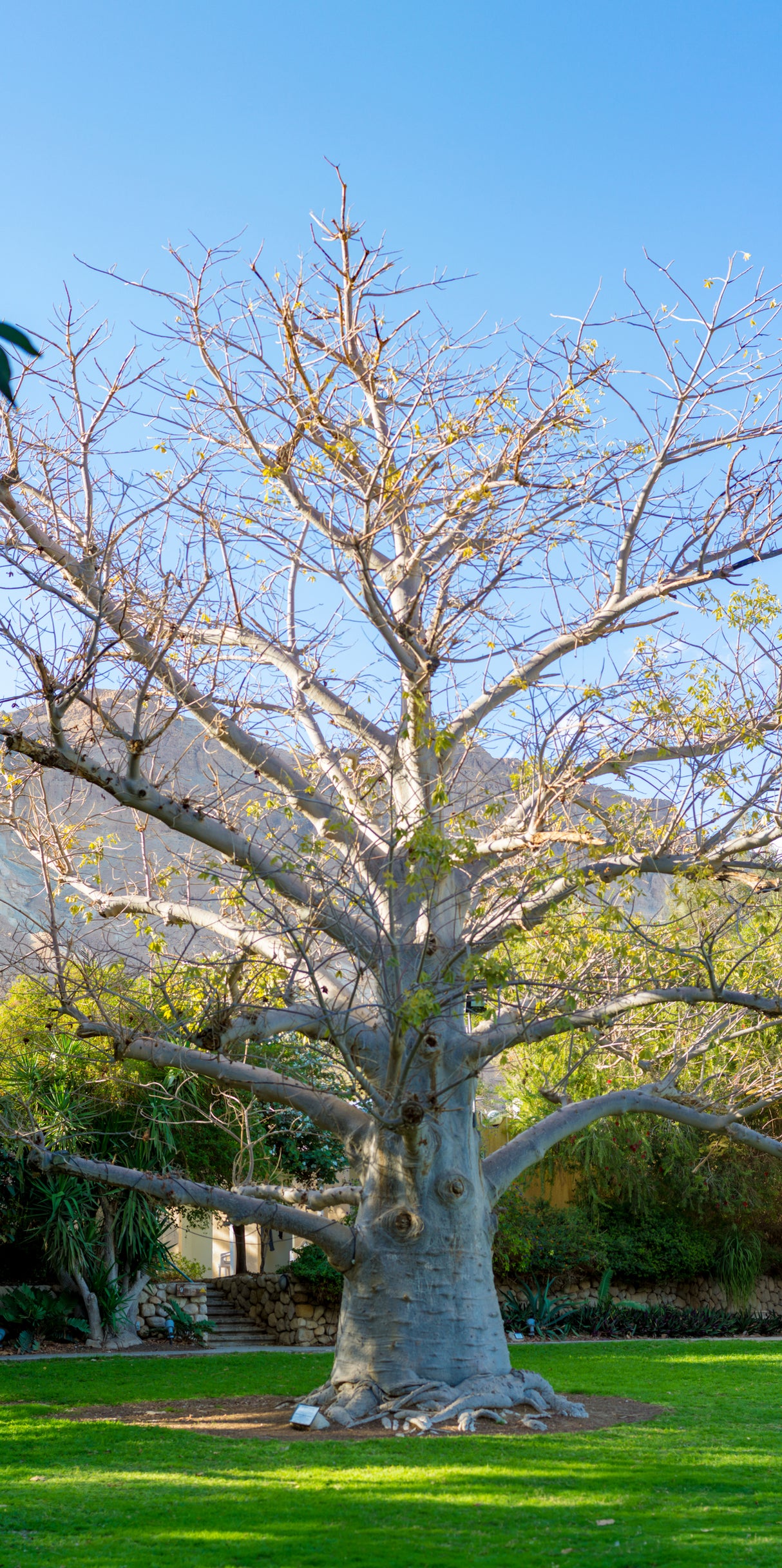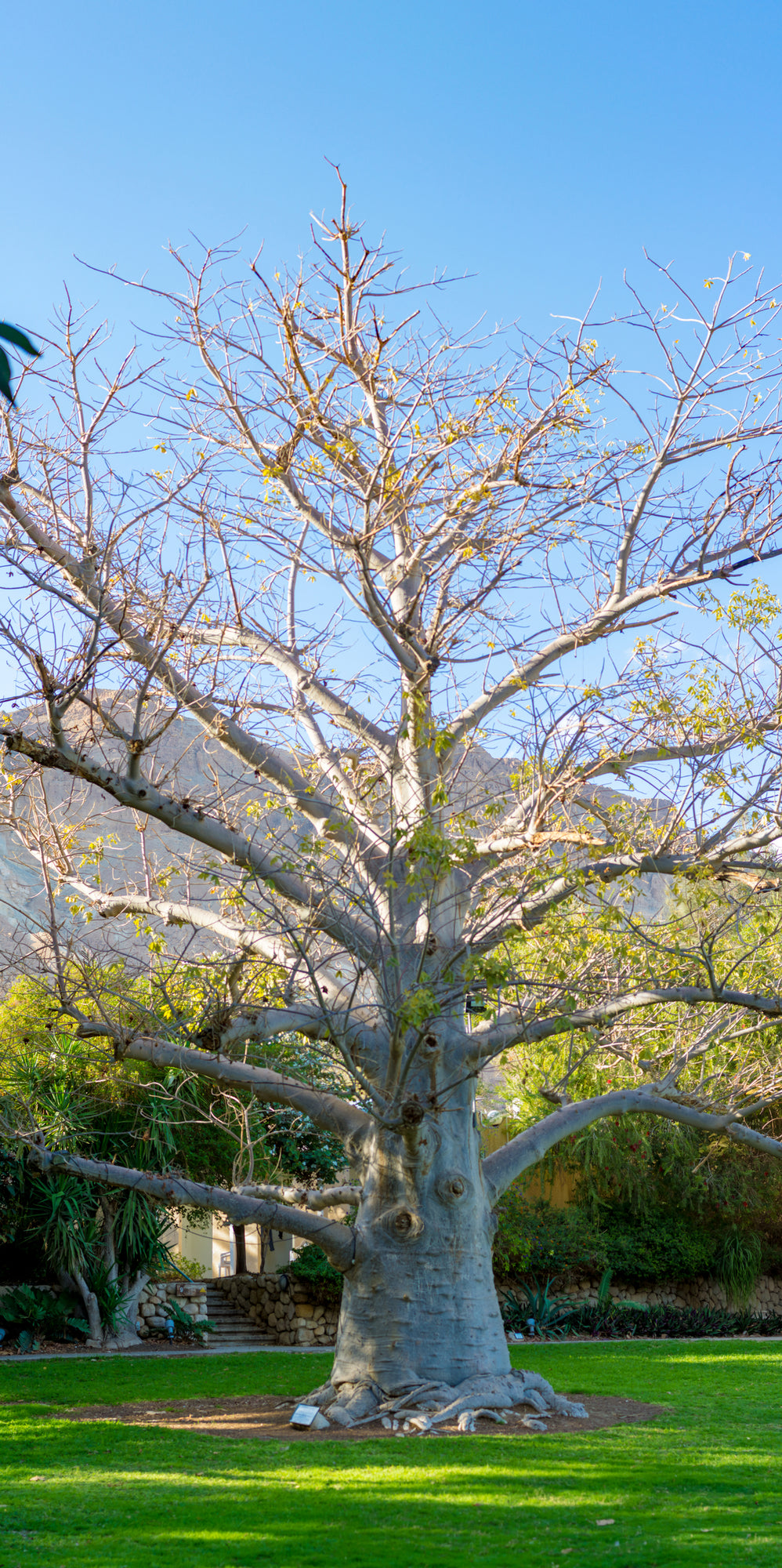Description
Description
The Adansonia digitata, or African Baobab, is an iconic deciduous tree native to Africa, celebrated for its massive, swollen trunk, unique silhouette, and longevity, often living for thousands of years. Reaching heights of 15–25 meters and trunk diameters up to 10 meters, it is a striking feature in large landscapes. The Baobab produces small, white, fragrant flowers and large, nutrient-rich fruits known as "monkey bread," valued for their high vitamin C content.
This drought-tolerant tree is perfectly adapted to arid environments, making it a symbol of resilience and a vital resource for local ecosystems and communities.
Specifications:
- Height: 15–25 meters
- Width: Up to 10 meters (trunk diameter)
- Native to: Sub-Saharan Africa
- Foliage: Palmate leaves that drop during the dry season
- Growth rate: Slow
Conditions:
- Soil: Prefers well-drained sandy or loamy soils; tolerates poor and rocky soils
- Light: Full sun
- Water: Very low; highly drought-tolerant once established
- Climate: Thrives in arid and semi-arid regions
Additional Features:
- Flowers: Large, white, fragrant blooms that open at night, pollinated by bats
- Fruit: Large, hard-shelled pods containing nutritious pulp and seeds
- Uses: Ideal as a feature tree in large landscapes, arid gardens, or conservation projects
- Spacing: Requires ample space due to its size and spreading canopy
- Low Maintenance: Extremely low care requirements once established
- Cultural Significance: Known as the "Tree of Life," providing food, water storage, and shelter in its native regions
- Environmental Benefits: Supports wildlife habitats, prevents soil erosion, and stores water in its trunk
The African Baobab is a majestic and ecologically significant tree, ideal for large-scale plantings in arid landscapes or as a symbol of strength and longevity in botanical collections.
Delivery Information
Delivery Information
We offer flexible delivery options to ensure your tree arrives in perfect condition, whether you're located nearby or on the other side of the world.
- Domestic Deliveries:
We provide reliable delivery services across the country, utilizing our fleet of specialized trucks and train freight networks. Whether you're in a metropolitan area or a remote location, we ensure your trees arrive safely and efficiently. - International Deliveries:
For our global customers, we coordinate delivery via sea freight. With 30+ years of exporting experience, every tree is carefully prepared to meet international biosecurity standards and packaged for safe transport to its destination.
Our team will work closely with you to arrange the most suitable delivery method based on your location, project timeline, and tree size. No matter where you are, we ensure a seamless delivery experience.
Have additional questions? Contact us to discuss your specific delivery requirements!
FAQ's
FAQ's
How are ex-ground trees prepared for delivery?
All ex-ground trees are carefully dug with their rootball intact to preserve the root system and minimize transplant shock. Each tree is stabilized and treated with specialized solutions to promote health during transit. The rootball is wrapped to retain moisture and protect it from damage, and water crystals are added to provide essential nutrients and hydration for the journey. These meticulous preparations ensure your tree remains healthy and ready for planting, whether it’s traveling across the country or overseas.
How long does delivery take?
Delivery times vary depending on your location and the size of your order. Domestic deliveries typically take 1–2 weeks, while international shipping may take several weeks depending on the destination. Contact us for specific timelines.
Are there minimum order quantities for delivery?
For local and nationwide orders, there are no strict minimums, though delivery costs may vary based on order size. For international orders, a minimum quantity is often required to optimize freight efficiency. Contact us to discuss your needs.
Do you provide installation services?
While we focus on the supply and delivery of trees, we can connect you with trusted landscaping partners who specialize in tree installation and site preparation.
Can I visit your farms to select trees?
Yes, we welcome visits to our farms by appointment. Seeing the trees in person allows you to select the perfect specimens for your project. Contact us to schedule a visit.



 Inspection available upon request
Inspection available upon request
 Photos are of example stock
Photos are of example stock
 International Delivery Available
International Delivery Available
 Available For Export
Available For Export
